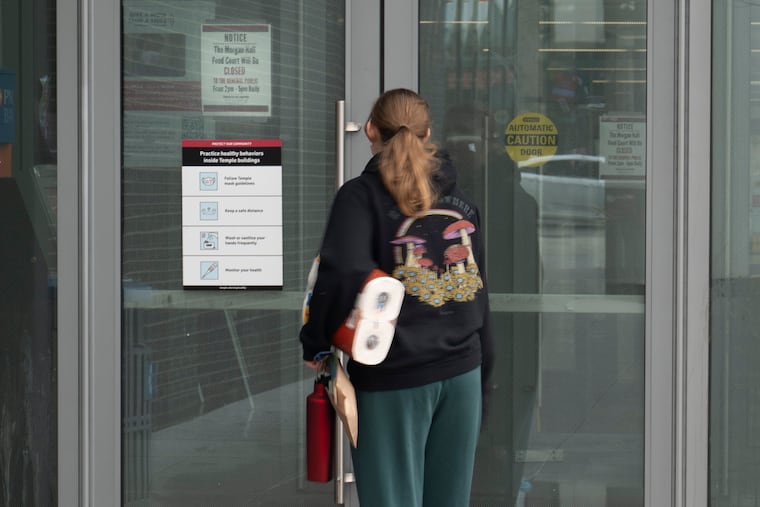Temple limits public access to campus food court amid growing safety concerns
The decision came after a gun was brought into the Morgan Hall food court by a patron, but Temple students wonder if a solution must come at the expense of having a public campus.

Temple University is limiting public access and pausing dine-in options for one of its main campus food courts following a rash of violent incidents.
First reported by CBS3, Temple announced it will close the Morgan Hall food court — which houses a Panda Express, Starbucks, and Chick-fil-A — to the public from 2 to 5 p.m. on weekdays and end indoor dining, effective Wednesday.
The policy was sparked by “a number of incidents involving patrons from outside the university,” Temple spokesperson Stephen Orbanek wrote in an email, including someone bringing a gun into the food court earlier this month and a viral fistfight several weeks prior.
The decision comes as Temple grieves the loss of Chris Fitzgerald, a university police officer who was shot blocks from campus last month, and faculty authorized a no-confidence vote for president Jason Wingard in part over safety concerns. The move has left students wondering whether there’s a way to improve campus safety without vilifying and extracting from the surrounding North Philadelphia community.
“It feels like everything [put forth by Temple administration] is just a placeholder for them to figure out something better,” said Rachel Kim, a sophomore public relations major from Montgomery County whose off-campus apartment is feet away from where Fitzgerald was shot.
» READ MORE: After an officer’s death, the community around Temple is feeling the weight of ongoing gun violence
Orbanek said the administration hopes that the food court can “eventually resume normal operations” and that Morgan Hall dining workers were supportive of the decision. He also noted that Temple plans to increase police presence around the food court indefinitely.
Six Temple students The Inquirer spoke with said they believe that the decision doesn’t address the overarching safety issues and faltering police relations while also penalizing North Philadelphia residents.
“I don’t think closing the dining hall for a few hours is going to solve the problem of violence. It’s going to solve the problems of violence in Temple buildings and bad PR,” said sophomore political science major Nate Weinberg, who is the social media manager for Keep Us Safe @ Temple University, a student organization that advocates for campus safety measures.
Weinberg’s group posted the video of the fight at the Morgan Hall food court to its Instagram, alongside dispatches from local news and police reports about violent happenings near campus, from robberies to shootings. He believes the food court closure timing coincides with neighborhood school dismissals, saying the food court has long been an after-school hangout for middle and high school students.
Other Temple students say the closure could undercut the university’s ability to build bridges with its North Philadelphia neighbors. Since the university began expanding its physical imprint in the 1960s, residents have expressed concerns about gentrification, halting plans for a football stadium as student housing contributes to neighborhood blight.
» READ MORE: Temple defends its police staffing struggles after the shooting death of one of its officers
“To ensure that we are best integrated with the North Philadelphia community, Temple University is an open campus. This illustrates our commitment to community engagement,” Orbanek said.
“I feel like restricting access to locals is not OK,” said Akhil Pramanik, a sophomore in the Fox Business school from Maryland. “Temple has already taken so much from them, the least we can do is let them have access to a food court with some chicken nuggets.”
Evan Acker, a sophomore finance major from Quakertown, said the closure could cause “a rift with the community.”
Students told The Inquirer they want the university to increase police presence around campus. Temple entered an agreement with the Philadelphia Police Department in March that will offer overtime to officers from districts across the city to patrol the area surrounding campus.
The number of shootings in the area patrolled by Temple police has tripled since 2018.
» READ MORE: Philly colleges don’t have to report all crimes that happen near campus. Should that law change?
“Students used to be opposed to taking this kind of action. ‘Defund the Temple Police’ was a really popular movement on campus in 2020 … and now people have done a 180,” said Joseph Rodriguez, a senior film and media arts major from Bryn Mawr.
In a recent poll of more than 1,000 Temple students conducted by the Temple News, 92% of respondents said they disproved of Wingard’s performance as president, and 75% ranked safety as the biggest challenge the university has to tackle.
The results resonate with Kim, who can see a memorial for Fitzgerald from the window of her off-campus apartment. She recently weighed taking classes from her home in Montgomery County.
“Wingard is just as lost as most people are,” Kim said. “That’s not comforting.”